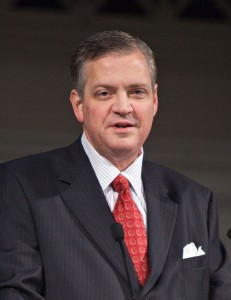
Al Mohler on the new Pope: How should Evangelicals respond?

Al Mohler
Dr. R. Albert Mohler, president of Southern Seminary, analyzes the papacy and offers thoughts on how Evangelicals should respond.
Listen to Dr. Mohler’s podcast here.
Attention Word Slingers readers: Beginning December 11, 2019, all posts will be available at BaptistMessenger.com. Thank you for reading Word Slingers!


Al Mohler
Dr. R. Albert Mohler, president of Southern Seminary, analyzes the papacy and offers thoughts on how Evangelicals should respond.
Listen to Dr. Mohler’s podcast here.

There are a lot of interesting things going on lately [awkward pause to drink some water] …so lets get started!
I’m not trying to get political, but did you see the response to the State of the Union address? That guy really came out swinging!
Things are crazy in DC, we just found out the US Post Office is coming out with a line of clothing. It’s fashion for people who are always on the slow.
I can’t wait for other government offices to come out with their own clothing designs. Next year the Hollywood red carpet question will change from “Who are you wearing? to “Hey, that’s my stuff!”
Speaking of the government, Washington is launching an investigation into that cruise ship disaster. So glad nobody was hurt, but it looks like Congress wants to see what they can do. If anyone knows about sinking ships, it’s the folks in DC.
You really can sue a ham sandwich?
Two New Jersey men are suing Subway sandwich shops saying their famous footling subs are not actually 12 inches long. I’m not sure if these guys are trying to be Heroes, or just they just have an ax in the Grinder.
They may be disappointed when they learn that Burger King & Dairy Queen are not of noble birth and that Chuck E. Cheese doesn’t really have middle name.

How do Christians live faithful and gospel-intentional lives in a culture that seeks to eliminate the uniqueness of the Christian message from the public square? It’s a difficult question that seems to be coming more and more of a reality.
This was seen recently in President Obama’s request for evangelical pastor and speaker Louie Giglio to offer the benediction at the upcoming inauguration. Giglio has been a leader in the Passion Conferences for college students for nearly two decades and a tireless voice to end human trafficking. Then a sermon he preached in the 90’s about the biblical position on homosexuality surfaced, and he was suddenly under fire.
The details are a little murky, but at the end of the day, Giglio was no longer offering the benediction. Words like ‘hate’, ‘bigot’, and ‘judgmental’ were being associated with a man who by all accounts is none of those things.
Sadly, this is becoming far more the norm rather than the exception. University campuses, supposed bastions of free speech, have recently tried to limit Christian clubs and organizations. Some universities have established ‘free speech zones’ as the only areas where free speech can take place. Workplace restrictions regarding religion are common and we are all too familiar with what happens if a political candidate speaks of the role his faith plays in his life.
So what should we do? Maybe the teaching of Jesus can help us through this. In John 15-16, Jesus offers several important reminders for believers living in a world that is hostile to the gospel. We need to remember…
– the world hated Jesus (therefore, we are not alone)
– the disdain for Jesus and by extension His followers comes from not knowing Jesus (therefore the importance and necessity of sharing Christ)
– as followers of Christ, we should expect opposition
– the context and circumstances of our culture’s attitude toward the gospel can’t deter us from our calling of faithfully living and speaking the whole truth of the gospel
May God grant us the grace to courageously and lovingly live out the gospel in our lives and words despite the intolerance of a tolerant culture.

>> by R. Albert Mohler Jr.
LOUISVILLE, Ky. (BP) — A new chapter in America’s moral revolution came today as Atlanta pastor Louie Giglio withdrew from giving the benediction at President Obama’s second inaugural ceremony. In a statement released to the White House and the Presidential Inaugural Committee, Giglio said he withdrew because of the furor that emerged yesterday (Jan. 9) after a liberal watchdog group revealed that almost 20 years ago he had preached a sermon in which he had stated that homosexuality is a sin and that the “only way out of a homosexual lifestyle … is through the healing power of Jesus.”
In other words, a Christian pastor has been effectively disinvited from delivering an inaugural prayer because he believes and teaches Christian truth.
The fact that Giglio was actually disinvited was made clear in a statement from Addie Whisenant of the Presidential Inaugural Committee:
“We were not aware of Pastor Giglio’s past comments at the time of his selection, and they don’t reflect our desire to celebrate the strength and diversity of our country at this inaugural. Pastor Giglio was asked to deliver the benediction in large part because of his leadership in combating human trafficking around the world. As we now work to select someone to deliver the benediction, we will ensure their beliefs reflect this administration’s vision of inclusion and acceptance for all Americans.”
That statement is, in effect, an embarrassed apology for having invited Louie Giglio in the first place. Whisenant’s statement apologizes for the Presidential Inaugural Committee’s failure to make certain that their selection had never, at any time, for any reason, believed that homosexuality is less than a perfectly acceptable lifestyle. The committee then promised to repent and learn from their failure, committing to select a replacement who would “reflect this administration’s vision of inclusion and acceptance.”
The imbroglio over Louie Giglio is the clearest evidence of the new Moral McCarthyism of our sexually “tolerant” age. During the infamous McCarthy hearings, witnesses would be asked, “Are you now or have you ever been a member of the Communist Party?”
In the version now to be employed by the Presidential Inaugural Committee, the question will be: “Are you now or have you ever been one who believes that homosexuality (or bisexuality, or transsexualism, etc.) is anything less than morally acceptable and worthy of celebration?”
Louie Giglio, pastor of Atlanta’s Passion City Church, also is founder of the Passion movement that brings tens of thousands of Christian young people together to hear Giglio, along with speakers such as John Piper. They urge a rising generation of young Christians to make a passionate commitment to Christ. In recent years, the movement also has sought to raise awareness and activism among young Christians on the issue of sex trafficking. It was that activism that caught the attention of both President Obama and the Presidential Inaugural Committee.
Note carefully that both the White House and the committee were ready to celebrate Giglio’s activism on sex trafficking, but all that was swept away by the Moral McCarthyism on the question of homosexuality.
Two other dimensions of this story also demand attention. First, we should note that Louie Giglio has not been known lately for taking any stand on the issue of homosexuality. To the contrary, Giglio’s own statement withdrawing from the invitation made this clear:
“Due to a message of mine that has surfaced from 15-20 years ago, it is likely that my participation, and the prayer I would offer, will be dwarfed by those seeking to make their agenda the focal point of the inauguration. Clearly, speaking on this issue has not been in the range of my priorities in the past fifteen years. Instead, my aim has been to call people to ultimate significance as we make much of Jesus Christ.”
A fair-minded reading of that statement indicates that Pastor Giglio has strategically avoided any confrontation with the issue of homosexuality for at least 15 years. The issue “has not been in the range of my priorities,” he said. Given the Bible’s insistence that sexual morality is inseparable from our “ultimate significance as we make much of Jesus Christ,” this must have been a difficult strategy. It is also a strategy that is very attractive to those who want to avoid being castigated as intolerant or homophobic. As this controversy makes abundantly clear, it is a failed strategy. Louie Giglio was cast out of the circle of the acceptable simply because a liberal watchdog group found one sermon he preached almost 20 years ago. If a preacher has ever taken a stand on biblical conviction, he risks being exposed decades after the fact. Anyone who teaches at any time, to any degree, that homosexual behavior is a sin is now to be cast out.
Second, we should note that Pastor Giglio’s sermon was, as we would expect and hope, filled with grace and the promise of the Gospel. Giglio did not just state that homosexuals are sinners — he made clear that every single human being is a sinner, in need of the redemption that is found only in Jesus Christ. “We’ve got to say to the homosexuals, the same thing that I say to you and that you would say to me … It’s not easy to change, but it’s possible to change,” he preached. He pointed his congregation, gay and straight, to “the healing power of Jesus.” He called his entire congregation to repent and come to Christ by faith.
That is the quintessential Christian Gospel. That is undiluted biblical truth. Those words are the consensus of the church for over 2,000 years and the firm belief held by the vast majority of Christians around the world today.
The Presidential Inaugural Committee and the White House have now declared historical, biblical Christianity to be out of bounds, casting it off the inaugural program as an embarrassment. By its newly articulated standard, any preacher who holds to the faith of the church for the last 2,000 years is persona non grata. By this standard, no Roman Catholic prelate or priest can participate in the ceremony. No evangelical who holds to biblical orthodoxy is welcome. The vast majority of Christians around the world have been disinvited. Mormons and the rabbis of Orthodox Judaism are out. Any Muslim imam who could walk freely in Cairo would be denied a place on the inaugural program. Billy Graham, who participated in at least 10 presidential inaugurations, is welcome no more. Rick Warren, who incited a similar controversy when he prayed at President Obama’s first inauguration, is way out of bounds. In the span of just four years, the rules are fully changed.
The gauntlet was thrown down yesterday, and the ax fell today. Wayne Besen, founder of the activist group Truth Wins Out, told The New York Times yesterday: “It is imperative that Giglio clarify his remarks and explain whether he has evolved on gay rights, like so many other faith and political leaders. It would be a shame to select a preacher with backward views on LBGT people at a moment when the nation is rapidly moving forward on our issues.”
And there you have it — anyone who has ever believed that homosexuality is morally problematic in any way must now offer public repentance and evidence of having “evolved” on the question. This is the language that President Obama used of his own “evolving” position on same-sex marriage. This is what is now openly demanded of Christians today. If you want to avoid being thrown off the program, you had better learn to evolve fast, and repent in public.
This is precisely what biblical Christians cannot do. While seeking to be gentle in spirit and ruthlessly Gospel-centered in speaking of any sin, we cannot cease to speak of sin as sin. To do so is not only to deny the authority of Scripture, not only to reject the moral consensus of the saints, but it undermines the Gospel itself. The Gospel makes no sense and is robbed of its saving power, if sin is denied as sin.
An imbroglio is a painful and embarrassing conflict. The imbroglio surrounding Louie Giglio is not only painful, it is revealing. We now see the new Moral McCarthyism in its undisguised and unvarnished reality. If you are a Christian, get ready for the question you will now undoubtedly face: “Do you now or have you ever believed that homosexuality is a sin?” There is nowhere to hide.
Original post: http://www.bpnews.net/BPnews.asp?ID=39504

We all remember the striking images of Columbine. Teenagers climbing out windows, buses used as bunkers, SWAT teams rushing in amongst a crowd of students whose biggest worry heading into that day was a history exam. These images were reimagined, yet no less horrible, recently in an elementary school in Newtown, Connecticut.
The President, in his stirring address to those of Newtown, marked that we cannot accept these events as routine. The government is entrenched in meetings and debates are being had. The role of the government to protect its citizens has now come to the issue of how to protect us from an unannounced enemy – ourselves.
I was reading a book recently and the author noted, “Often what human beings do is so horrible that we can be excused, perhaps, for thinking that all that matters is stopping it. But this is an evasion of the real horror: the heart from which the terrible actions come.”
Sadly when tragedy strikes, we often look at how to fight the symptoms of a much deeper cancer. We call for more guns, less guns, prayer in school, commandments on the wall, more legislation, less legislation. But what we have to understand is that what we deal with is not a gun-control issue or a governmental issue – it’s a gospel issue. At the front line of gospel issues is not the government or lobbyists, but the church.
Sin, in whatever form, whether a theater shooting or a lustful thought is grievous to God and equal at the foot of the cross. We sin because we are sinners. That’s the root, regardless of the manifestation. As the church, these events should drive us to prayer more than politics.
I am indeed thankful for Christians involved in the political process. But we must remember all political processes are means to temporary ends this side of heaven. Stopping the unannounced enemy will not be accomplished by a voting body, but by the body of Christ – led by the Spirit – in submission to Jesus our Savior. Let us champion that banner for real change and like John pray, “Lord come soon.”

LOUISVILLE, Ky. (BP)—A prominent seminary president had the rare opportunity to engage a former president on his beliefs surrounding the importance and interpretation of the Bible.
R. Albert Mohler Jr., president of Southern Seminary in Louisville, Ky., interviewed former President Jimmy Carter on an edition of Mohler’s “Thinking in Public” podcast. Titled, “The Bible Meets the Modern Age: A Conversation with Former President Jimmy Carter,” Mohler’s interview with Carter spanned almost an hour.
Mohler’s questions focused on Carter’s love for the Scriptures along with how the Bible functioned in his calling as an elected official and ultimately, as president of the United States. Carter became known for the outward expression of his faith at a time when evangelicalism was derided as anti-intellectual.
When asked how he understands the inspiration of Scripture, Carter replied, “I think all of the Bible is divinely inspired, but it was interpreted . . . by fallible human beings, who were constrained by their knowledge of facts about the universe, for instance, when they wrote.”
Carter continued, “I believe the basic thrust of the Bible, the basic message of the Bible, is epitomized in the life of Christ and in the teachings of Jesus Christ. And I also believe there is nothing in the Old Testament that contradicts the basic teachings of Christ for peace, justice, humility, love and so forth.”
Carter went on to say that he believes in the biblical miracles, but even if he didn’t, “I would still believe in Christ as my Savior. I would still try to pattern my life and my own fallible human ways after Jesus’ life.”
Though the interview was a public reflection on Carter’s faith, the interview did include controversial subjects.
Mohler questioned Carter on the Bible’s teaching on sexuality, particularly homosexuality.
Carter stated, “Well I have to admit, Dr. Mohler, that I’m kind of selective on that point of view. I turn almost exclusively to the teachings of Jesus Christ, who never mentioned homosexuality at all as a sin. He never condemned homosexuals, and so I don’t condemn homosexuals. At our little church in Plains (Ga.), we don’t ask, when people come to join our church, if they’re gay or not. We don’t ordain, we don’t practice marriage between gay couples in our church, but that’s a Baptist privilege of autonomy of local churches. I’m against any sort of government law, either state or national, that would force churches to perform marriage between gay people, but I have no objection to civil ceremonies. And so, I know that Paul condemns homosexuality, as he did some other things like selfishness that everybody’s guilty of, so I believe Jesus reached out to people who were outcast, who were condemned, brought them in as equals and I also pretty well rely on Paul’s writing to the Galatians that everyone is equal in the eye’s of God and we’re treated with compassion. And I personally believe, maybe contrary to many of your listeners, that homosexuality is ingrained in a person’s character and is not something they adopt and can abandon at will. So I know what I’ve just explained to you might be somewhat controversial, but it’s the way I feel.”
Carter went on to explain his views on abortion: “I have one problem in my political service with my faith and that is concerning abortion. I have never believed that Jesus Christ would approve abortion, so I had to interpret my duties as president compatible with the Supreme Court ruling in Roe vs. Wade, but with my religious beliefs, I did everything I possibly could to minimize a need for abortion by liberalizing adoption services and by starting a (federal) program —it’s still in existence, by the way—called Women and Infant Children. One of the key reasons for abortions around the world is when a pregnant mother doesn’t think she and her baby will be cared for. So I did everything I could to minimize abortions because I don’t believe Jesus would approve of a liberal interpretation of that law.”
Asked what his understanding is concerning the Gospel and the necessity of personal faith in Jesus Christ to be saved, Carter replied, “I teach every Sunday in my classes that it is necessary for full salvation and acceptance before God to believe in Jesus Christ. The question then comes up, though, ‘However, how about the people that don’t know about Christ? How about the ones to whom Christians, evangelicals, have never reached or given them the message?’ And I don’t feel constrained, Dr. Mohler, to condemn those people as lost or as going to hell, and I rationalize it, perhaps, in using theological terms, in using biblical terms, by Jesus’ admonish that we should not judge other people, but let God be the Judge. So, in a quandary like that about people who don’t know about Christ, what would be their fate? I’m inclined to believe that they will not be condemned or punished by God.”
Carter has had a fractious relationship with the Southern Baptist Convention. Mohler provided Carter the time to express his feelings on the convention, which Carter distanced himself from as the denomination grew more conservative. He has gone so far as to call the denomination’s complementarian views on human sexuality and gender “discriminatory.”
Carter told Mohler, “I really became concerned about the basic thrust of the Southern Baptist Convention on two or three issues that happened in Florida in the Convention when (the annual meeting) was there, in particularly, the status of women. I feel very strongly, in the eyes of God, women are equal to men and to choose the particular passages that say that women have to be subservient to men and that they should not teach men and boys, I think it contrary to the basic thrust of what Christ meant and said. I know that you have a different belief in that and Southern Baptists do as well. My wife happens to be a deacon in our little church in Plains that I’ve described already. We have two pastors—one is a man, and one is his wife. They both are ordained and I participated in the ordination, so I believe that throughout religious faith women should be treated equally with men.”
Though professedly different in many of their views, both Mohler and Carter expressed appreciation for each other. Carter went so far as to express the need for further conversation with Mohler, albeit in a more private setting.
Mohler, who typically ends his program with commentary, cast Carter’s view of the Bible as problematic.
“President Carter speaks warmly of his love for the Bible, but he also reveals a view of the Bible’s inspiration and authority that rejects inerrancy and opens the door for what he describes as a ‘selective’ application of the Scriptures when it comes to many issues,” Mohler said.
Mohler continued, “There have been several twists and turns in terms of the last several years in which I have found myself at odds with the former president, often engaged in public controversy over matters that both of us consider to be of very grave importance. When you have that kind of public disagreement, much less with a former president of the United States, there are risks in any kind of conversation. That is what makes me all the more appreciative of President Carter’s willingness to enter into this conversation and for his remarkable candor and honesty throughout the course of the conversation. President Carter is a man of intellectual integrity.”
Mohler, though, expressed deep concern over Carter’s use of the Bible, calling his approach “neo-orthodox”—a type of interpretation often associated with 20th-Century theologian Karl Barth. “As he made clear in this conversation,” Mohler said, Carter doesn’t believe in plenary verbal inspiration, meaning that Carter doesn’t believe every word of the Bible is inerrant.
Mohler contrasted Carter’s view of the Bible with his own:
“I believe that the Scripture is the inerrant and infallible Word of God. I believe that God inspired men, yes, and the writers of Scripture as Scripture says of itself, to write in such a way that they were preserved and protected from all error such that when Scripture speaks, God speaks. That puts a constraint upon us that does not allow the kind of selectivity that we could just claim as an interpretive principle.”
Mohler also critiqued Carter’s rejection of the Gospel’s exclusivity.
“I believe that Scripture very clearly does say that there is a dual destiny,” Mohler said. “The differentiation of which has to do solely with whether one has come to a saving knowledge of the Lord Jesus Christ. The Apostle Paul in Romans 10 says that ‘All who call upon the name of the Lord shall be saved.’ But then it makes very clear that those who are saved are those who indeed hear the Gospel and respond to it and believe.”
The Mohler-Carter discussion, along with a transcript is available athttp://www.albertmohler.com/2012/03/26/tip-temp/. The audio also is available on iTunes.
Andrew Walker writes for the Institute on Religion & Democracy (theird.org), where a version of this story first appeared.